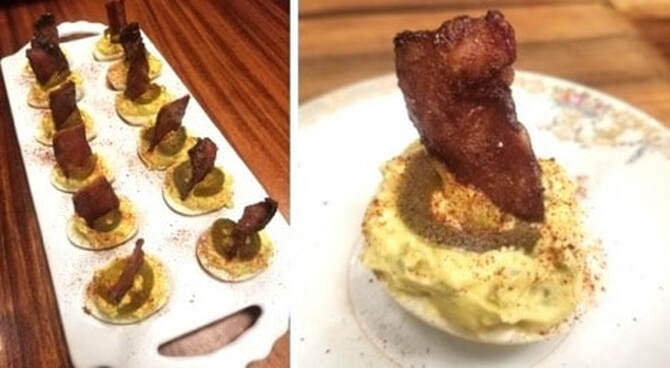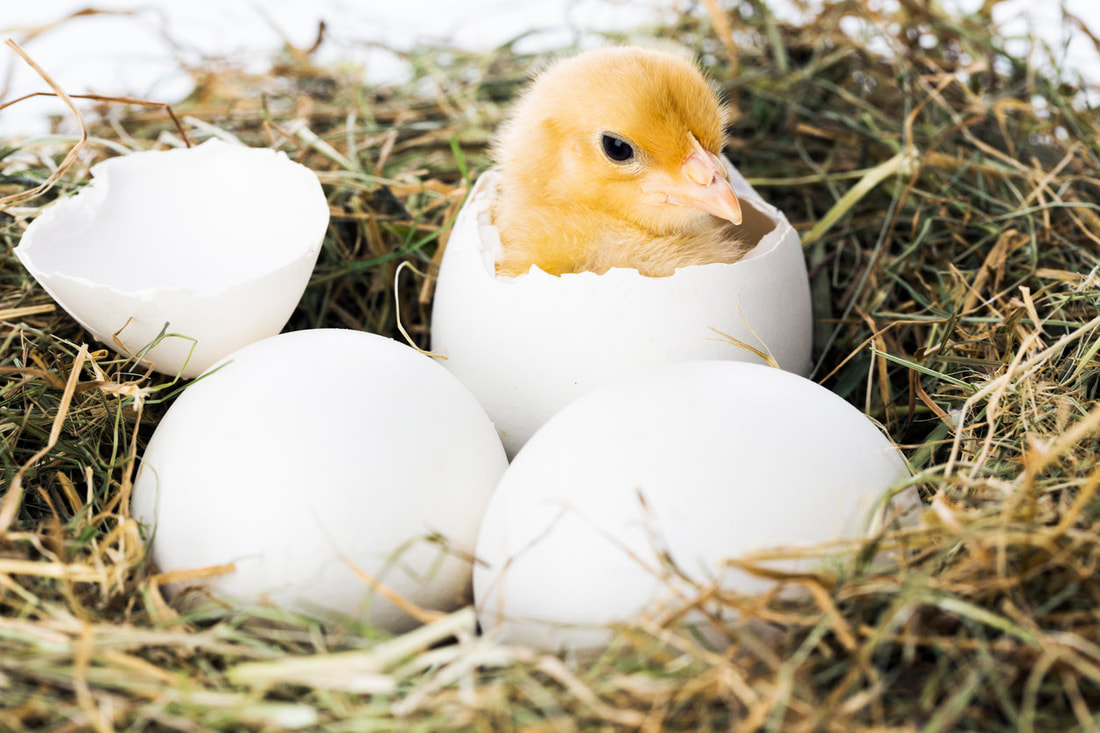|
The taste of deviled eggs immediately takes me to family Christmas parties, July 4th celebrations, and Easter get-togethers. They have always been a staple in my family. My mother was the designated deviled egg maker for our large family and would make dozens at a time. She would let my brother, sister and I “stuff” the eggs, but always warned us not to eat the stuffing UNLESS there was stuffing leftover after all of the eggs were filled. But most of the time, she would end up boiling extra eggs to account for the extra stuffing that we would eat. I would like to say that I have outgrown that temptation, but I have not.
Deviled eggs are creamy, yummy little packages of flavor. They are extremely versatile and can be sweet or savory, and can be topped with just about anything. I never say no to eggs, and now have many from my mother and friend’s backyard chickens. So, in coming up with what to do with the eggs, the first thing that came to my mind was deviled eggs. I was going to make deviled eggs topped with pickled shrimp, but a friend of mine suggested topping with candied bacon. Though the shrimp topping is tasty, I was intrigued by the combination of crispy, smoky-sweet bacon topping the decadent eggs. This recipe also introduces a tiny bit of heat by also dusting the bacon in cayenne and topping the eggs with slices of pickled jalapeno. I also mixed sweet and dill relish for the stuffing, and added just a touch of cayenne. In the end it is a wonderful cornucopia of flavors of sweet and sour, with just the right amount of heat! Thanks so much to my friend for this suggestion; It is definitely a keeper! I served the eggs with pimento cheese, toast, stone-ground mustard and sweet gherkins. Make and Enjoy! Servings: 12 deviled eggs Ingredients: 6 eggs, hard boiled and peeled 4 slices thick-cut bacon ¼ cup brown sugar 2 tablespoons cayenne powder and more to taste ¼ good quality mayonnaise 1 teaspoon yellow mustard ½ tablespoon sweet relish ½ tablespoon dill relish Salt and pepper to taste 12 slices pickled jalapeño, cut in half Paprika if desired for garnish For the bacon:
For the eggs:
1 Comment
Raising baby chicks can be a lot of fun for the whole family. They're adorable, funny and so sweet. However, they are live animals and any baby animal must be treated with care. In addition to the regular care you should take with raising birds, there are also several chick diseases you want to watch out for. Here are two of the most common diseases or conditions along with treatment method and preventative measures you can take.
Coccidiosis This is the number one killer of baby chicks and the disease you most need to worry about. This is a highly contagious parasitic disease of the intestinal tract. This disease can kill your chicks so quickly, you may not know they have it until you've already lost it. Sick chicks may be weak and listless and have bloody or foamy stool. Prevent Coccidiosis by buying pre-vaccinated chicks or making sure chicks you hatch at home are vaccinated or fed medicated feed early on. Treat sick chicks with a Corid 9.6% liquid solution. The dosage is 9.5cc to a gallon of water for five days. Make sure to isolate sick chicks from all other chicks. Dehydration Dehydration is both very serious and a very easy condition for chicks to come down with. Dehydrated chicks can die very quickly from dehydration so you should always take all measures to prevent this and treat it very quickly if it happens. Dehydrated chicks will become pale in the face, start to pant or breathe heavily and become listless and weak. To prevent dehydration always keep clean, cool, fresh water available in a place the chicks can easily reach. Change it frequently as chicks will get their water dirty very quickly. To treat dehydration, wrap the chick in a tow and provide water with electrolytes via medicine dropper a few drops at a time. You can also provide the water and dip their beak in to encourage them to drink. Hatching Backyard Chickens from Eggs
Picture an elementary school classroom. On a desk at one end sits a small incubator with a few quiet eggs. Little faces peer with wonder through the glass. As the children watch with rapt attention, a little beak moves. The little chick works. She works and works, poking and pecking at the outside of her shell until finally she's out. Wobbly, she stands next to the broken egg shell as the children cheer. You don't have to be a child to experience the childlike joy and wonder that comes from watching a chicken hatch from an egg. Anyone can hatch chickens from eggs in an incubator. You can set it up right in your living room. Once the chicks hatch and grow into adult chickens, you can add them to an existing backyard flock, or use them to start one. Hatching chickens from eggs is a fun and rewarding experience. Here's a list of things you will need if you want to get started: The Incubator There are a lot of choices for incubators so try not to get overwhelmed. You could buy one from a supplier, or, if you think this is a one-time project, rent one. Try calling agricultural schools, farms or schools in your area go see if they have one you can borrow or rent. If you don't have any luck finding a local place to borrow one from, try searching for incubator rentals online. You can find a place like this one that can rent you an incubator for a short period of time. If you decide to buy, a quick internet search will get you a ton of options. Some things to keep in mind when choosing your incubator:
All your set up efforts would seem kind of silly if you didn't get eggs, right? But where? Again, local agricultural schools and farms are a good resource here. If you go with a local farm, you may not have much of a choice over what kind of chickens you get. If this is important to you, you should probably turn to the internet. Many hatcheries will ship fertile eggs to you, and you can pick the breed of chicken. Pick a breed based on your needs. If you want power layers, go for something like the Rhode Island Red, or another one from this list. If you are working with limited space, bantams are a good option. They're mini chickens, but they can still give you delicious eggs. Other Stuff
Once you've got everything ready, you sit back and… wait. Your incubated eggs will take approximately 21 days to hatch. As they say, the waiting is the hardest part! |
PopWorms!®
|
|
Site Map
|
Products
Dry Products
PopWorms!® ECO Popworms!® ECO Bulk PopWorms!® PRO Live Products PopWorms!® LIVE PopWorms!® Leftovers |
Shipping
Site-wide
Free Shipping Over $25 |



 RSS Feed
RSS Feed


